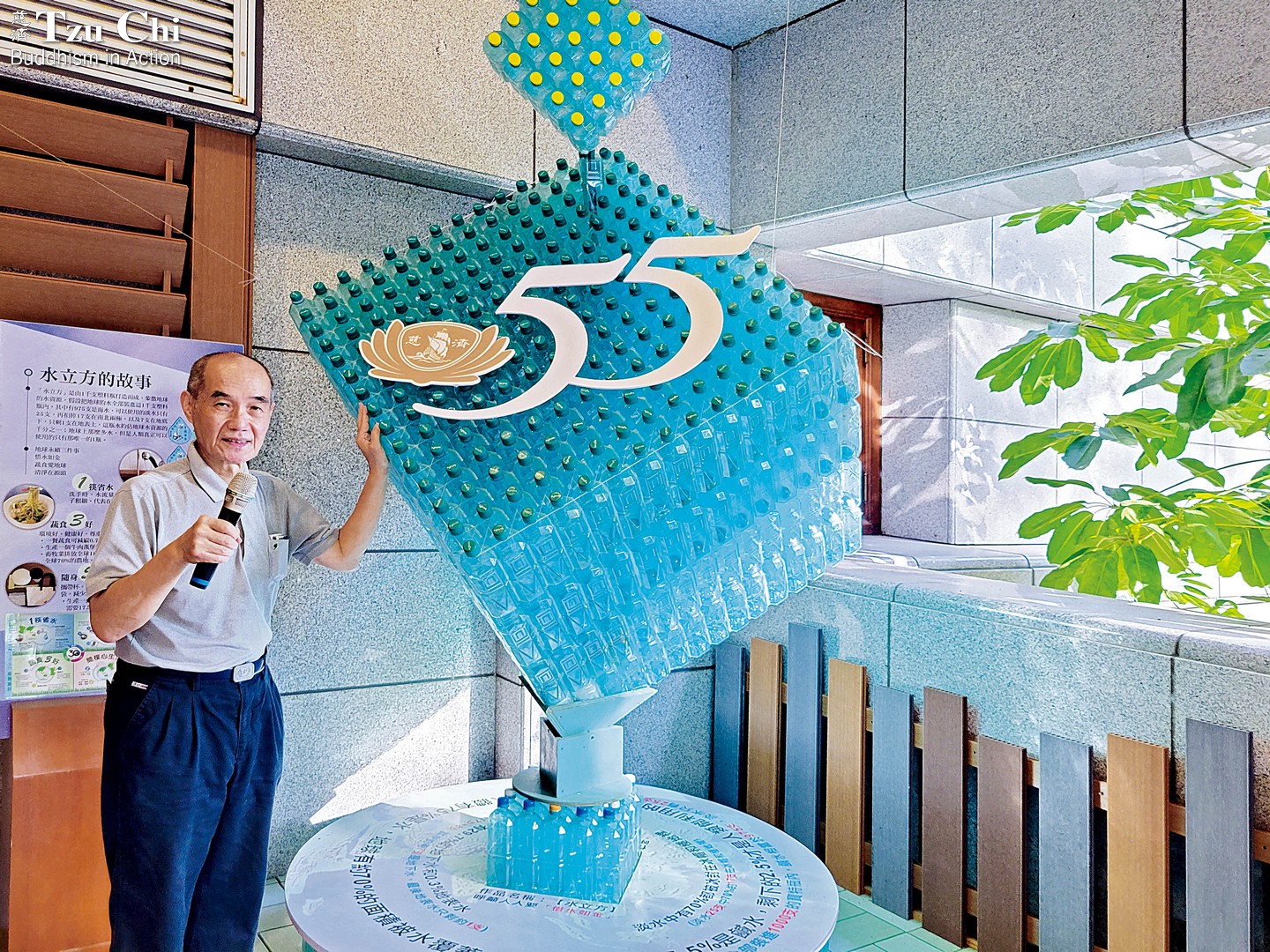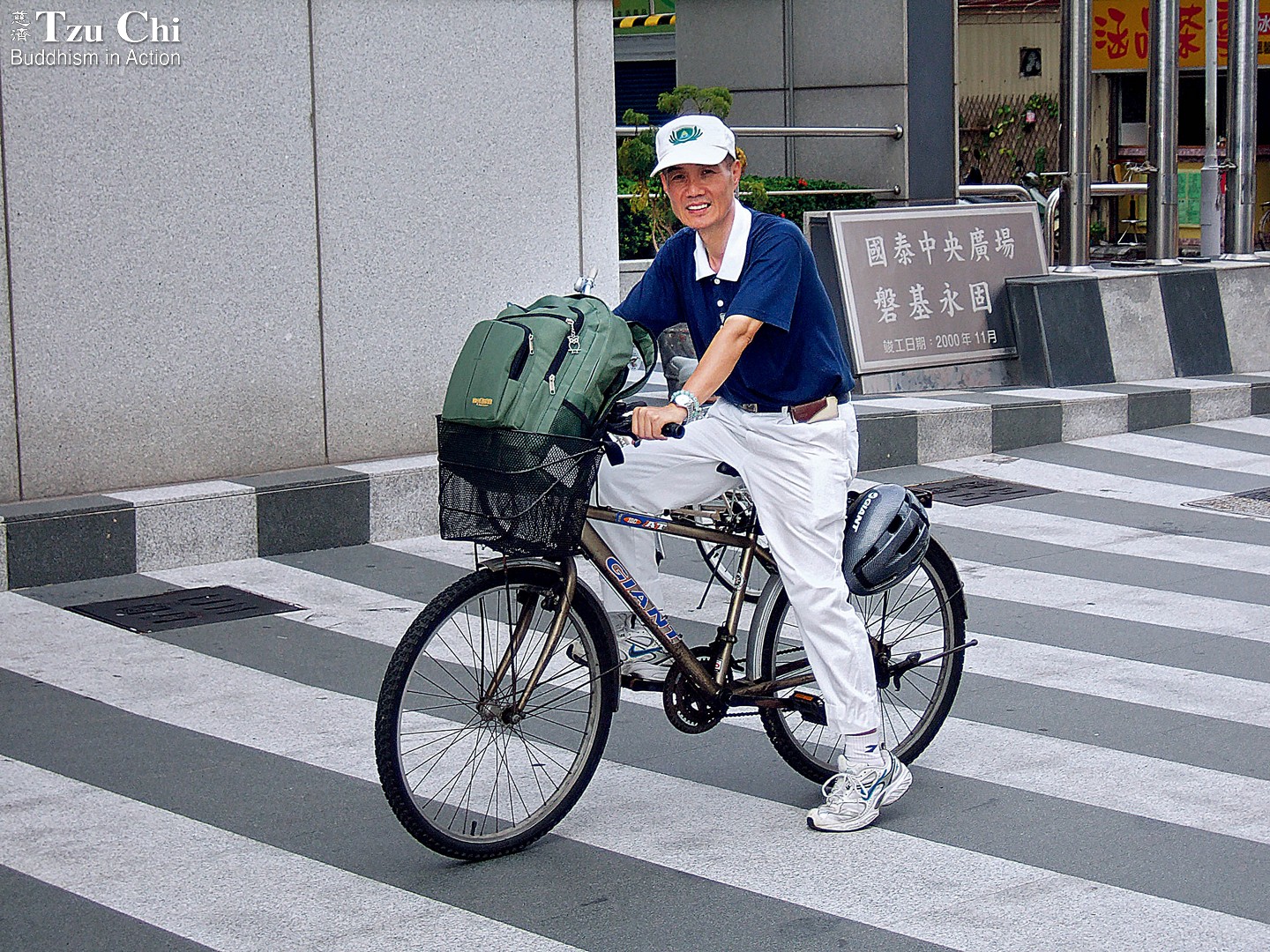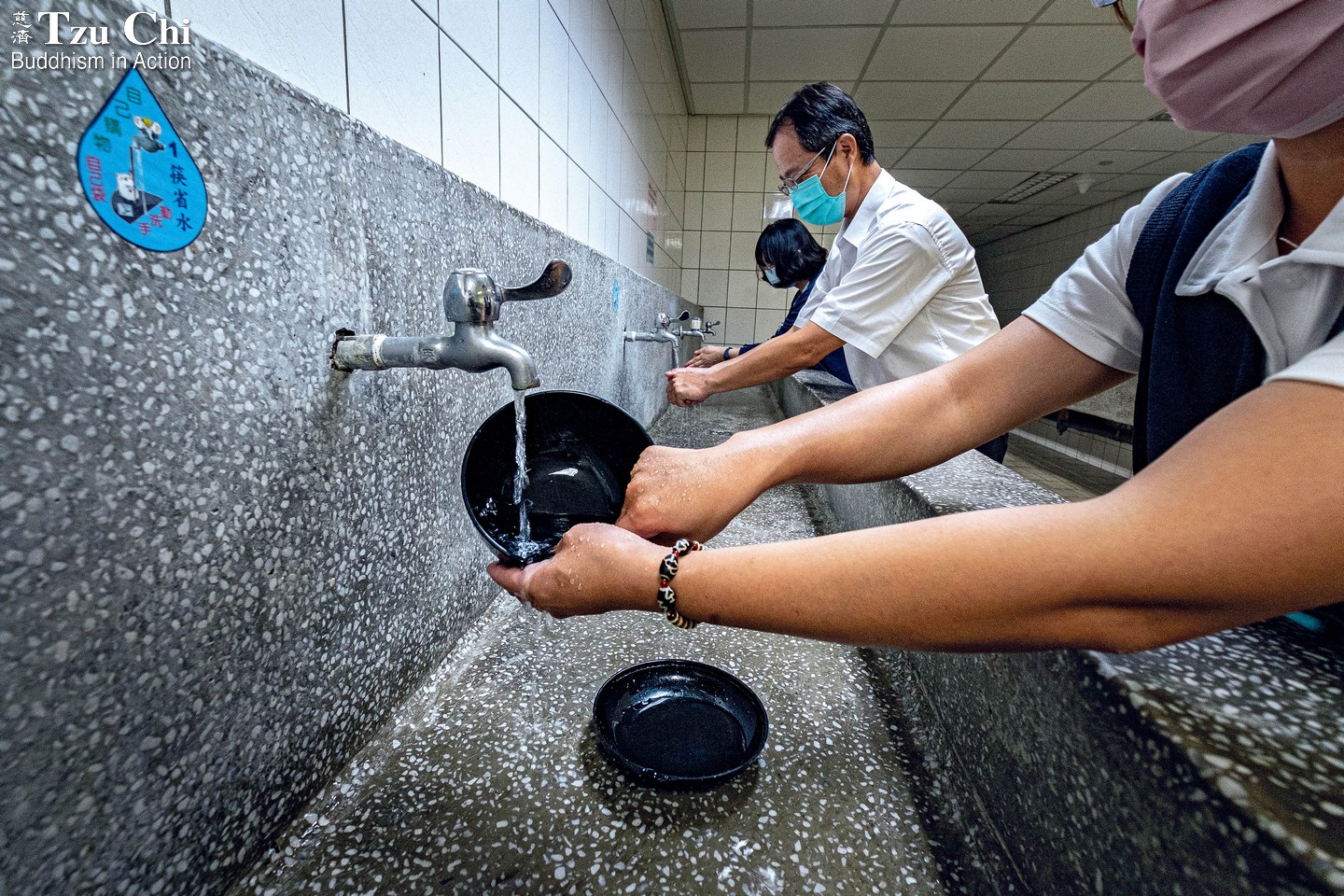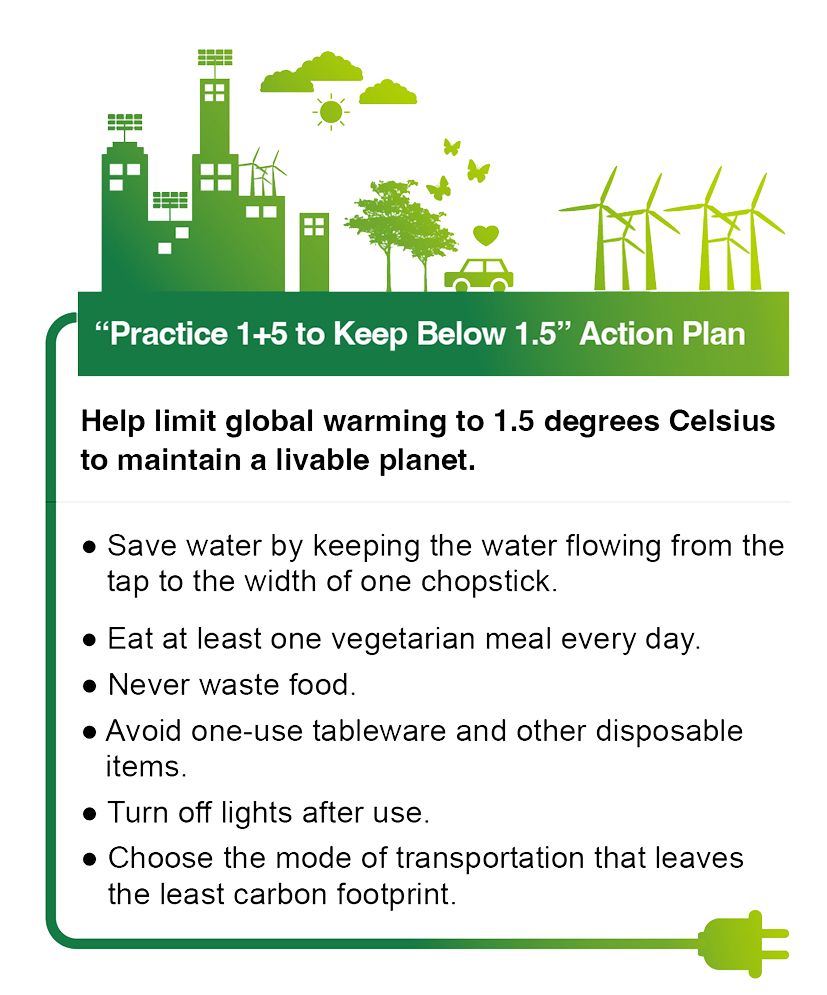By Yeh Tzu-hao
Abridged and translated by Wu Hsiao-ting
Photos courtesy of Jer Lin Chen
I’m willing to promote environmental education for 30 more years—until I am 101 years old. I believe I’ll live to see the day when human beings succeed in limiting global warming to 1.5 degrees Celsius. —Jer Lin Chen

Jer Lin Chen created Water Cube, an installation made up of a thousand PET bottles, to explain how precious water resources are on the planet.
“One time, I drove my SUV to give a talk about environmental protection to a group of students,” said Jer Lin Chen (陳哲霖), a Tzu Chi environmental education lecturer. “Afterwards, it occurred me: ‘These middle and elementary school students I talked to do not drive at all. Who leads a lower-carbon, more energy-saving lifestyle: me or them?’”
Realizing that he wasn’t practicing what he preached, he began to bike as much as possible to get around, including to his speaking engagements when the distance was manageable. Practice makes perfect. Now he can easily ride 30 kilometers (19 miles) without feeling tired at all. If for nothing else, showing up at a speaking engagement on a bicycle instead of in an emissions-spewing vehicle gives more credence to his lectures on environmental protection.
As an environmental education lecturer, Chen has taken part in many activities held by government or private organizations to increase eco-awareness. It was not unusual that event sponsors included as many as 50 to a hundred items in their action plan for a more eco-friendly lifestyle. A seasoned environmental promoter, however, Chen believes in brevity and simplicity when it comes to encouraging people to take action to protect the Earth. He knows it is better to start with less than ten steps and work from there. The most important thing is not just to know, but to do.
On June 28 this year, Chen won a National Environmental Education Award, given by Taiwan’s Environmental Protection Administration. “I no longer remembered all the things I did in the past for the environment,” he said. “But applying for the award caused me to reflect on how I embarked on the path of environmental education. It all started 16 years ago when I joined Tzu Chi as a recycling volunteer.”
Chen retired from the technology industry in 2005, when he was just 55 years old. After his retirement, he and his wife began volunteering at the Tzu Chi Bagualiao Recycling Station in Kaohsiung, southern Taiwan. Guided tours were given to members of the public visiting the station. Before long, Chen observed that when explaining how to correctly sort recycling, what one volunteer taught a group of visitors might be different from that of another volunteer. The mixed messages sparked his creativity to come up with a mnemonic for remembering the different types of recyclables. Made up of just ten Chinese characters and numbers, his mnemonic was easy to remember and quickly became the standard chant to teach people about what materials were recyclable. Chen was good at presenting recycling in a lively way, so speaking invitations began flooding in. He was invited to give talks on how to sort recyclables and do other things to protect our environment, not only at Tzu Chi recycling stations, but also to schools and organizations.
To broaden and enrich his knowledge of environmental protection, Chen began studying in 2018 at the Graduate Institute of Environmental Education at National Taiwan Normal University in Taipei, northern Taiwan. His age at the time—69—easily made him the oldest student in the entire graduate institute. Though he was already an environmental lecturer certified by the Environmental Protection Administration, obtaining his master’s degree was important—but what mattered even more was to deepen his knowledge of the environment, and then be able to transform such knowledge into simple, practical approaches to help people protect the Earth.

Jer Lin Chen, an environmental education lecturer, bikes to his speaking engagements whenever possible.
Work together to keep below 1.5C
Over the last couple of years, country after country has pledged to achieve net zero emissions by 2050. This indicates that clean energy such as solar and wind power will be replacing fossil fuels in the near future, as pointed out by Thomas Friedman, the author of Hot, Flat, and Crowded: Why We Need a Green Revolution—And How It Can Renew America. Anticipating the transition to clean energy, many government officials and corporation owners around the world have felt a sense of urgency: “If we don’t take action today, we’ll regret it tomorrow.”
Chen believes that it is the inescapable responsibility of the government and industry sectors to push the use of green energy and the implementation of other carbon reduction measures. With them leading the way and building the necessary infrastructure, emissions can be cut by upwards of 50 percent. However, he emphasizes it’s also important to recognize the impact individuals can make by being more eco-conscious and environmentally friendly in their daily lives. We can all contribute to carbon reduction by making more judicious choices in terms of how we live, how we get around, and what we eat. “Even though such efforts can’t help cut emissions by as much as 50 percent,” Chen said, “they can at least help achieve a 30 percent reduction.”
Chen made an action plan for how everyone can cut carbon emissions in their daily lives. He called the plan: “Practice 1+5 to Keep Below 1.5.” Climate scientists have warned that the increase in global temperature must be kept below 1.5 degrees Celsius to avoid the worst impacts, i.e. severe climate disruptions that could exacerbate drought and other disasters worldwide. To stay below that safe limit of 1.5 degrees Celsius, humanity must make meaningful cuts to carbon dioxide and other greenhouse gas emissions in the coming decades.
Chen’s action plan includes six items to help people reduce their carbon footprint: (1) Save water. He advises everyone to keep the water flowing from their tap to the width of one chopstick; (2) Eat at least one vegetarian meal every day or go vegetarian; (3) Never waste food; (4) Avoid one-use tableware and other disposable items. He suggests people carry reusable cups, bowls, eating utensils, handkerchiefs, and shopping bags; (5) Turn off lights after use. In other words, conserve energy as much as you can; and (6) Choose the mode of transportation that leaves the least carbon footprint.
“To sum up,” Chen said, “we can’t leave it to a handful of people if we want to meet the net zero and sustainability goals. We are in this together.”

Using tap water Chen’s way—keeping the water flowing to the width of one chopstick—can save a lot of water, and it works just as well as a greater flow. Huang Xiao-zhe
Create the future you want
Chen has created many easy-to-remember catch phrases and effective presentation props or visual aids to help him promote recycling and enhance environmental awareness. One of his best-known creations is Water Cube, an installation made up of a thousand recycled PET bottles. “If we use a thousand PET bottles to represent all the water in the world, the amount of water humans can access is equivalent to just one bottle,” Chen explained. “This shows how precious water resources are. This creation of mine [Water Cube] led me to develop the ‘chopstick’ idea in using water [that is, keeping the water flowing from the tap to the width of one chopstick].”
“I’m willing to promote environmental education for 30 more years—until I’m 101 years old,” Chen added. He pledged to cultivate 3,000 people in those 30 years who not only live an eco-friendly life themselves but can give talks on and help spread the importance of environmental protection. According to the United Nations’ Intergovernmental Panel on Climate Change, global temperatures will stabilize when greenhouse gas emissions reach net zero. For 1.5C, this means achieving net zero emissions globally in the early 2050s. Chen, now 71, believes he’ll live to see the day when human beings succeed in limiting the planet’s warming to the crucial 1.5C threshold.
“When the future looks dim, people tend to be more pessimistic,” Chen said. He remarked that he can understand why many young people nowadays choose not to get married and have children—he knows that they feel helpless in the face of the various problems facing society and the world today, such as severe income inequality and the climate crisis. However, he is convinced that by increasing public awareness and knowledge of environmental issues via environmental education, more and more people will see the importance of green living and net zero emissions, and be prompted to take action to help. He believes that the future is promising.
It’s the same the other way around, however. Change won’t just happen on its own. If people continue to turn a deaf ear to the warnings of climate experts, or refuse to take seriously their organization or company’s carbon-reduction plans, humanity’s progress to achieve carbon neutrality will slow down, or be delayed to the point it’s too late to do anything.
“Keep below 1.5 and make a sustainable Earth possible,” Chen urged. “Any change in the right direction gets us closer to our goal.”




